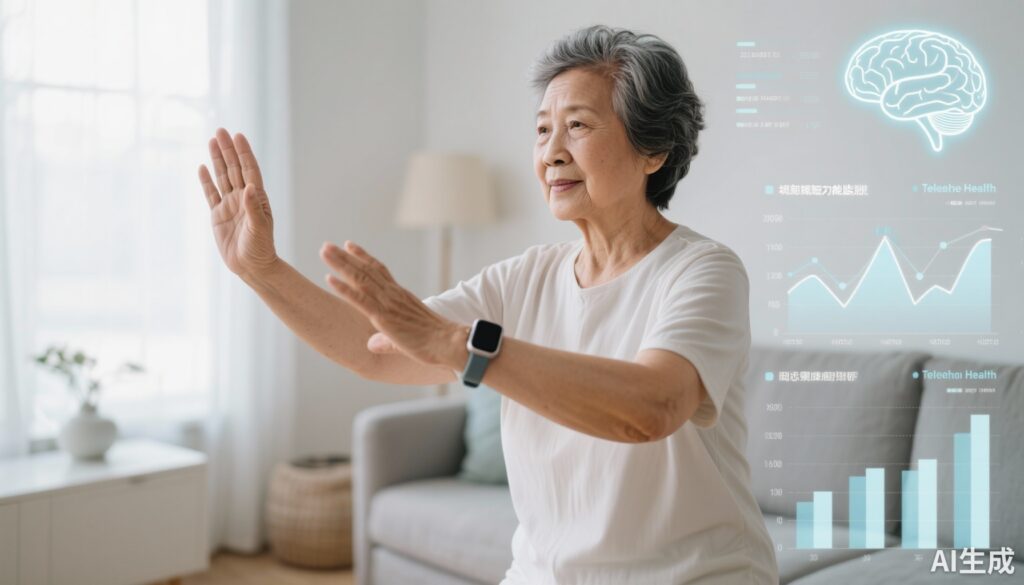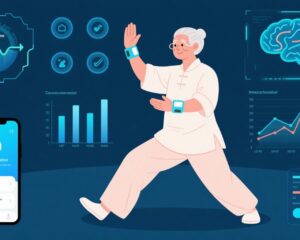Study Background and Disease Burden
Type 2 diabetes mellitus (T2DM) represents a significant global health challenge, particularly among older adults who are at elevated risk of cognitive decline and dementia. Cognitive impairment associated with diabetes is multifactorial, including vascular complications, metabolic dysregulation, and neurodegenerative processes. Given the growing elderly diabetic population, strategies to preserve or improve cognitive function are urgently needed to reduce morbidity, preserve independence, and enhance quality of life. Exercise therapy is considered a cornerstone intervention in managing diabetes and its complications, with mounting evidence suggesting neuroprotective benefits. However, traditional exercise programs often face barriers related to accessibility, adherence, and monitoring.
Telemedicine and mobile health (mHealth) technologies offer innovative platforms to deliver and monitor exercise interventions remotely, potentially overcoming many of these challenges. Tai Chi, an ancient mind-body exercise characterized by slow, deliberate movements and breathing techniques, has shown promise in improving cognitive outcomes through mechanisms related to physical activity, balance, coordination, and stress reduction. Yet, its effects specifically in older adults with T2DM, particularly when combined with wearable monitoring in a telemedicine context, require rigorous evaluation.
Study Design
This investigator-initiated, randomized controlled trial (RCT) enrolled older adults with T2DM and allocated participants equally (1:1:1) into three parallel arms: usual care, fitness walking, and Tai Chi exercise. Usual care encompassed standard diabetes education without structured physical exercise intervention.
The two active intervention arms received supervised exercise regimens for 12 weeks. The fitness walking group performed treadmill walking under researcher supervision thrice weekly. The Tai Chi group practiced the 24-style Simplified Tai Chi via live video streaming led by certified instructors, fostering real-time engagement and feedback.
Key digital health technologies complemented the interventions. All participants wore continuous glucose monitoring (CGM) sensors (Guardian Sensors 3) on the upper arm and wrist-worn bracelets tracking heart rate, sleep quality, and step count. Assessments were conducted at baseline and 12 weeks.
The primary endpoint was the Montreal Cognitive Assessment (MoCA) score at 12 weeks, a validated cognitive screening tool sensitive to mild cognitive impairment (MCI). Secondary endpoints included cognitive subdomain tests such as the Memory Quotient (MQ) and Trail Making Test Part B (TMT-B), plus metabolic indices.
Key Findings
After 12 weeks, the Tai Chi group experienced a statistically significant improvement in MoCA scores compared with baseline (mean difference 23.83 vs 21.42; P=.03) and compared to fitness walking (2.65 vs 1.44; P<.05). The fitness walking group showed non-significant MoCA improvements relative to their baseline (22.94 vs 21.58; P=0.08) and usual care (0.23; P=0.83).
Additional cognitive assessments underscored Tai Chi’s superiority. The Tai Chi group had significantly enhanced Memory Quotient scores compared to fitness walking (99.23 vs 89.23; P=.001) and better performance on TMT-B (207.33 vs 225.58 seconds; P=.001), indicating improved executive function and processing speed.
Wearable device data revealed Tai Chi participants demonstrated enhanced sleep quality parameters, a factor known to influence cognitive function. While physical activity increased in both exercise groups, Tai Chi’s cognitive benefits surpassed fitness walking despite similar step counts and heart rates, suggesting additional neuropsychological mechanisms.
No adverse events were reported, confirming the safety and feasibility of remotely delivered exercise regimens supported by wearable monitoring.
Expert Commentary
This well-structured RCT innovatively combines traditional exercise modalities with modern mHealth technologies to assess cognitive outcomes in a vulnerable population. The significant improvements in global cognition and specific domains with Tai Chi versus fitness walking highlight the importance of exercise type beyond mere physical activity volume.
Tai Chi’s integration of meditative mindfulness, controlled breathing, and complex motor sequences likely augments neuroplasticity, stress reduction, and cerebral perfusion. Wearable devices enable objective adherence and physiological monitoring, enhancing intervention fidelity and personalized feedback.
Limitations include the relatively short duration (12 weeks), which may not capture longer-term cognitive trajectories. The study population, motivated to engage in home-based exercises with technology, may limit generalizability to less tech-savvy cohorts. Further trials are warranted to explore dose-response relationships, mechanistic biomarkers such as neuroimaging or neurotrophic factors, and clinical endpoints like dementia incidence.
Conclusion
This pioneering RCT demonstrates that Tai Chi, delivered through a telemedicine platform and supported by wearable device monitoring, significantly enhances cognitive function and sleep quality in older adults with type 2 diabetes compared to fitness walking or usual care. These findings advocate for the incorporation of mind-body exercise programs within diabetes management frameworks, leveraging mHealth to maximize reach and impact.
Future research should explore long-term benefits and integrate multidomain interventions targeting cognitive health in diabetes, potentially reshaping clinical practice and public health policies for aging populations.
References
Chen XS, Liu HZ, Fang J, Wang SJ, Han YX, Meng J, Han Y, Zou HM, Gu Q, Hu X, Ma QW, Huang F. Effects of Tai Chi on Cognitive Function in Older Adults With Type 2 Diabetes Mellitus: Randomized Controlled Trial Using Wearable Devices in a Mobile Health Model. J Med Internet Res. 2025 Sep 16;27:e77014. doi: 10.2196/77014. PMID: 40957073; PMCID: PMC12440321.
Additional relevant literature for further reading:
– Li J, et al. Effects of Tai Chi on Cognitive Function in Older Adults: A Meta-Analysis. J Alzheimers Dis. 2014;42(2):507-517.
– Bruce DG, et al. Diabetes and cognitive decline in older adults: Cause, effect, or both? Curr Diabetes Rep. 2020;20(9):44.
– Liu Y, et al. Role of Wearable Devices in Improving Physical Activity and Health Outcomes in Older Adults with Chronic Conditions: A Systematic Review. J Telemed Telecare. 2022;28(1):3-15.



